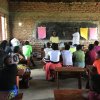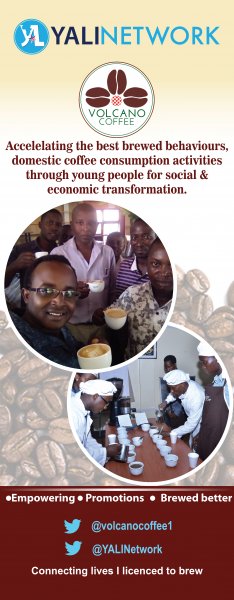19 Results Are Tagged With "Uganda"

Girls Annual Empowerment Camp
I held a Girls Annual Empowerment Camp on 28th December 2022 in my community in Mbale- Uganda . It was a great way to end the year with the girls sharing on issues that had challenged them during the year and make new resolutions for the next year. We discussed issues on academic excellence, Girl Child rights and adolescent development and reproductive health.
Girls were able to freely share their stories that showed resilience and confidence to pave a great future for themselves and society
Call for Volunteers/Interns and Researchers
GIRLS PAINT AFRICA GREEN COUNTRY AMBASSADORS
Ready to work on climate change
recruiting young girls to planting green species and protect environment
coordinate and represent his or her country youth in the climate change training
ready to start same chapters in his or her country among other as she will be explained
TelFis Linkage of Obstetric Fistula survivors to Surgeons in Rural Eastern Uganda
Expiration: September 29, 2018Pregnancy and childbirth should be a special time in the lives of women and families. Unfortunately, it can also be a time of great danger. Fistula is an abnormal opening in the birth canal resulting in uncontrollable, constant leakage of urine and/or fecesi. Approximately between 140, 000 to 200,000 women in Uganda live with obstetric fistula with an annual occurrence rate of 1,900 casesii. Uganda currently ranks third in the countries with the greatest obstetric fistula cases in the world as per the World Health Organization (WHO) rankings. However, only a very small proportion of them have sought treatment for their condition yet, on average, women with obstetric fistula live with their condition for 10 years. Demystifying the myths about Fistula through the establishment of Toll free telephone referral service at Fistula centers for confidential assessment/ identification and referral for eligible patients for routine fistula surgeries will be key in this approach.
Fistula repair in Uganda is constrained by limited number of obstetric fistula specialists hence need for the linkage to utilize the few specialisits , low awareness among frontline health workers such as nurses, VHTs both in government and private health care facilities, transportation costs and stigmatization that comes from the continuous leakage of urine and/or fecal matter. These limitations are exacerbated by illiterate, uneducated population, majority of whom are women living in rural areas where there is limited awareness and access to health services.
In Uganda, the majority of patients are treated in obstetric fistula surgical camps by local and visiting fistula surgeons, with success rates of above 80% being reportediii. Despite these efforts, women in hard to reach areas and with limited access to ICTS do not have timely information and access to these camps, therefore fistula repair and reintegration in the country still remains low, with an accumulated 4,300 fistula cases reported at health facilities still awaiting repair countrywideiv. These 4,300 cases represent a small minority of the women with fistula in the country, yet with increase awareness would increase substantially. This backlog of cases causes women to wait months to years to receive treatment and therefore with the introduction of a toll- free referral communication platform, this backlog will be history.
There is an urgent need to have dedicated regional treatment centers within designated government and Mission regional hospitals that can offer either free or subsided fistula repair surgeries to patients on an ongoing basis. In addition, rehabilitation and reintegration services for fistula survivors in Uganda lack comprehensive packages. Some of organizations providing services operate on a small scale and can only assist with transportation refunds and basic counseling. Yet obstetric fistula has social, economic, political and psychological consequences for affected women and their families, such as stigmatization, low esteem and loss of social support for both treated and untreated women with fistula.
Through the AEIF funding, our team proposes the creation of a dual system of information access, referral, treatment, follow- up and a vertical integration that is novel in fistula treatment for Uganda. By leveraging community knowledge through the phone line, enhanced capacity of front line health workers, a regular operational referral site and comprehensive rehabilitation and re-integration approach, we expect attention to be drawn to this site from all over the region therefore increasing community awareness and the number of fistula patients.
Telfis will be a phone line assessment/referral medium for suspected obstetric Fistula patients. In partnership with a Telcom service provider, a toll-free line will be set up at the Fistula Center (Kamuli Mission Hospitalv) with two assessors at the call center to offer counselling, assessment and referral for routine surgeries and post-treatment check-ups at the hospital. Through these platforms, Fistula Ambassadors, Health Center staff, Religious leaders, Community leaders will directly reach out to the Fistula center through the various mediums and the patients identified will be scheduled for further management at the center.
Working in a static ward offers many advantages over the transitory “repair camps” and this D- prize award will support in tandem creation of one permanent routine fistula ward in Kamuli Mission Hospital, which will be dedicated specifically to fistula treatment. Our near plan will be to expand to other regional centers which will serve as centers for surgical training programs that will help foster innovation in techniques and methods for physical and psychosocial rehabilitation of fistula survivors. The dedicated centers will also help raise continued awareness and understanding about fistula. The very presence of a fistula center will help bring the condition to a great attention of many. Doctors and staff at the centers will develop a deep understanding of fistula, and often become powerful advocates for its prevention and treatment. The clinical expertise and consistent follow up to the sisterhood that forms among fistula patients is also natured.
AEIF: LOCAL WASTE FOR CHARCOAL BRIQUETTES; Making girls financially independent.
Expiration: September 29, 2018Local waste for charcoal briquettes is a project intended to equip high school girls with simple entrepreneurial skill that will enable them become more self reliant to reduce their vulnerability to sugar daddies. Muyenga High school is located near the slum ares of Namuwongo and this is where most of the students come from. They have to walk daily to and from the school and this leaves them exposed to the threats of sexual workers and greedy man who persuade them into unprotected sex in exchange for a ride to school or some little money for break fast or a new under wear.
During the 10 years of teaching at Muyenga high school , i have counselled many of such girls to keep them focused to the fruits of education. Despite the efforts, many have fallen into the trap of deceitful men and they end up pregnant, infected with HIV/AIDS and abandoned. With my salary, I could not extend financial support to each and every one of them and hence my moral spiritual and academic counselling was not enough to keep them in school. Many girls in different regions of Uganda go through the same challenges and end up dropping out of school due to financial frustrations.
It is upon this that I have come up with an initiative with other three ILEP AND TEA alumni in the selected districts to engage the girls in making charcoal briquettes so as to raise some income for their basic requirements, reduce home expenditure on fuel and also take lead in maintaining good sanitation and environmental conservation. From my pilot project, the briquettes are made using waste bio-wastes such as food peelings, paper, litter from trees, grasses, etc and these are locally available in all schools and homes. On the contrary, the way of disposal of this waste is poor and this has led to out break of diseases like cholera in the slums.some of it is just burnt in open space while some is dumped in roadside trenches leading to flooding. Putting the waste to use will help to make the girls more financially independent, help their families to reduce expenditure on fuel, address the challenges of poor sanitation in school and control the global challenge of environmental degradation.our target is to train 500 vulnerable girls in 30 schools in Kampala, wakiso Gulu and luwero districts in Uganda. Each Alumni in the team of 4 will coordinate with the at least 6 school in his/her respective district. some schools with close proximity will be combined for the training.
PROMOTING SEXUAL AND REPRODUCTIVE HEALTH INFORMATION AND LIFE SKILLS AMONG YOUNG PEOPLE 10-24 YEARS IN KASAWO SECONDARY SCHOOL
INTEGRATED HIV/AIDS PREVENTION THROUGH MITIGATING DOMESTIC VIOLENCE AND RADICALISATION AMONG THE YOUTH IN UGANDA
Humphrey Alumna Taps into her Global Family to Fight Trafficking
Leveraging the exchange alumni network, Anges's work to combat trafficking has impacted thousands in Uganda and internationally.
Brewed-Better Intervations.
Description
Promoting the best brewed Better engagements in Uganda is very needful, Ugandans Farm coffee unfortunately dot not drink it, two or more of reasons is Poor brewing behaviors practices or poor quality management during the post harvest handling.
At volcano coffee, we have embarked on a strong campaign code named- Acceleration of coffee domestic consumption for social & economic transformation through engaging the Young people along the coffee chains for positive mind change and job opportunit
Image

